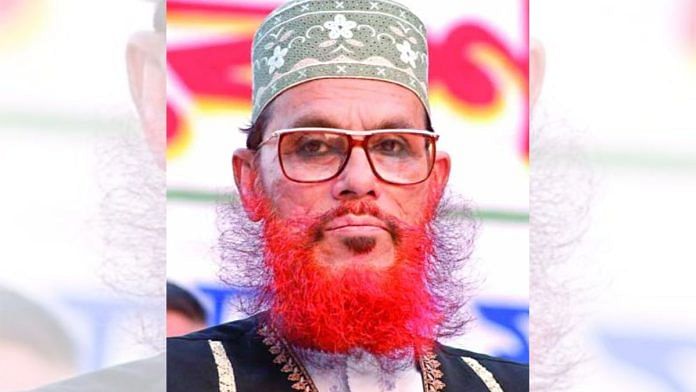Soon after the death of Naib Amir or the spiritual head of Bangladesh Jamaat-e-Islami, Delwar Hossain Sayeedi, on 14 August, a picture of his face superimposed on the moon began circulating on various social media platforms in Bangladesh. It is ironic that a man who was against the very idea of Bangladesh was being venerated like this.
His followers, quite a substantial number in the country given the outpouring of grief on social media and the size of the crowd that came to his burial at his hometown in coastal Pirojpur district, made the moon picture widely popular on social media, inviting both online admiration and derision.
Mourners protest
This was not the first time that Sayeedi’s face had appeared on the moon. His supporters had claimed in 2013 that Muslims from Bangladesh to Saudi Arabia saw his face pasted on the moon and it is God’s sign that Sayeedi is a true devotee.
“To draw attention of the people who do not use internet, announcements were made through loudspeakers of mosques about the picture, report our correspondents from Chittagong, Rajshahi and Bogra. Besides, many people called The Daily Star staff members from different districts to verify if such a moon was really sighted,” The Daily Star had reported on 4 March 2013.
Meanwhile, grief turned into anti-government protests as supporters mourned Sayeedi. “We won’t let the blood of Sayedee go in vain,” supporters shouted. Many blamed the government of Prime Minister Sheikh Hasina, which is preparing for general elections slated for January, reported AFP on 15 August. One person was also reportedly killed during a confrontation between police and a group attempting to hold a memorial ceremony for Sayeedi.
Also read: Bangladesh gangrape survivor fears 2024 polls. The 2001 election violence changed her life
Who was Delwar Hossain Sayeedi?
The answer to this question will depend on who you ask in Bangladesh. Sayeedi was the vice president of the opposition Jamaat-e-Islami. He was Naib Amir or the spiritual head of the Islamist party since 2009. His Islamic teachings had attracted a substantial number of followers in his lifetime.
To the government of the day and the courts of the country, though, Sayeedi was nothing more than a convicted war criminal who needed to be locked up for life. In 2013, he was given the death penalty on two counts of crimes against humanity by the war crimes tribunal. He was accused of murder, arson and rape.
“Known as ‘Deilya Razakar’ in 1971, Sayeedi was found guilty of committing crimes against humanity during the 1971 Liberation War… These include the murder of Bisabali and arson in a Hindu neighbourhood, abduction and rape of three sisters of Gauranga Saha, who was a prosecution witness and identified Sayedee as the man who had handed over his sisters to the Pakistani army to be taken away as sex slaves. They were returned after three days,” bdnews24.com reported on 31 March 2015, when the Supreme Court of Bangladesh released the full verdict. A year later, the death sentence was commuted to life imprisonment.
But before the war crimes tribunal was set up in 2019 to investigate and prosecute suspects for the genocide committed in 1971 by the Pakistan army and their local collaborators, Sayeedi was an elected member of parliament from 1996 to 2008.
Internationally, Sayeedi was a man of much prominence. In 1982, on the invitation of Iran’s supreme leader Imam Syed Ali Hussaini Khomeini, Sayeedi visited Tehran to celebrate Iran’s first revolution anniversary. In 1991, he joined the Kuwait–Iraq war memorial meeting at the invitation of the Saudi king Fahd bin Abdulaziz Al Saud. In 1991, the Islamic Circle of North America awarded him the title “Allama” (profound scholar). In 1993, Sayeedi was awarded the “Grand Marshal” medal at the American Muslim Day Parade Conference in front of the United Nations headquarters in New York.
Also read: Rabindranath Tagore is polarising in new Bangladesh—for his Hinduness, Sanskritised Bangla
Against the very idea of Bangladesh
It is ironic that Sayedee breathed his last at Bangabandhu Sheikh Mujib Medical University named after the founder of Bangladesh. The 1971 war of liberation was fought to dehyphenate East Pakistan from West Pakistan and to establish a socio-cultural and linguistic identity over a religious identity. In the bloody war that followed, if Bangabandhu Sheikh Mujib stood at one corner, Delwar Hossain Sayeedi stood at exactly the opposite. A Razakar or a member of a Islamic paramilitary volunteer force, Sayeedi sided with the Pakistani army and went against his own people, the Bengalis, to stop East Pakistan from becoming Bangladesh. He and people like him failed.
But the tragedy of modern Bangladesh is that the cult of Delwar Hossain Sayeedi is not over. Even though Bangladesh was created, Sheikh Mujib was murdered on 15 August 1975 along with most of his family members, by forces inimical to the idea of Bangladesh. Many Sayeedis continue to thrive and expand their influence in Bangladesh against what Bangladesh was supposed to be. It is no wonder that the country’s principal opposition party, the Bangladesh Nationalist Party, has officially expressed condolences on his death.
“Sayeedi’s views on women and minorities are despicable to say the least. He was a convicted war criminal who sided with forces that threaten to disrupt Bangladesh till date. No death should be celebrated, but Sayedee’s hopefully ends a dark chapter in Bangladesh’s history,” Sahidul Hasan Khokon, Bangladeshi journalist, told ThePrint.
The photoshopped image of Sayeedi’s face on the moon may be fodder for memes, but his cult is not funny.
Views are personal.
(Edited by Ratan Priya)



